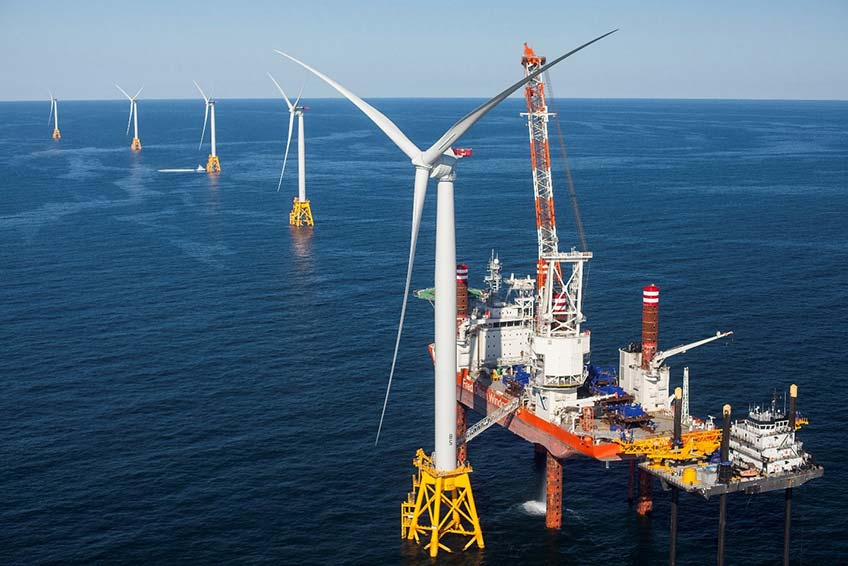Offshore Wind Market Projections Indicate Accelerated Growth Over Next Decade

Wind turbines under construction at the Block Island Wind Farm off the coast of Rhode Island. Photo courtesy of Deepwater Wind
Offshore wind market growth predictions show accelerated growth in the next decade, with cumulative capacity ranging from 154 to 193 gigawatts (GW) by 2030, and long-range predictions of over 500 GW by 2050, according to a just-released report from the National Renewable Energy Laboratory (NREL).
Highlighting opportunities for domestic offshore wind development, the 2018 Offshore Wind Technologies Market Report provides offshore wind policymakers, regulators, developers, researchers, engineers, financiers, supply chain participants, and other stakeholders with up-to-date quantitative information about the offshore wind market, technology, and cost trends in the United States and worldwide. Written by NREL researchers Walter Musial, Philipp Beiter, Jake Nunemaker, Vahan Gevorgian, and Paul Spitsen from the Department of Energy, the report provides detailed information on the domestic offshore wind industry and its technical and market barriers.
Funded by the Department of Energy’s Wind Energy Technologies Office, the report covers the status of the 176 operating offshore wind projects through Dec. 31, 2018. The report also provides the status of, and analysis on, a broader global pipeline of 838 projects in various stages of development.
- In 2018, the U.S. offshore wind energy project development and operational pipeline grew 1.4% to a potential generating capacity of 25,824 megawatts (MW).
- State-level policy commitments accelerated, driving increased market interest in offshore
wind development.
- Offshore wind interest grew in California with the passage of Senate Bill 100, the 100 Percent Clean Energy Act of 2018.
- Increased U.S. market interest spurred strong competition at offshore wind lease auctions.
Higher offshore wind lease sale prices indicate:
- Increased confidence in future market growth driven by state policies
- Confidence in the regulatory and financial institutions to support offshore wind project development in the nascent U.S. market
- Continued cost reductions
- Heightened demand for offshore wind in the northeastern United States.
- Industry forecasts suggest U.S. offshore wind capacity could grow from 11 to 16 GW by 2030.
- The global wind industry installed a record 5,652 MW of offshore wind capacity in
2018.
- By the end of 2018, cumulative global offshore wind installed capacity grew to 22,592 MW from 176 operating projects. As of Dec. 31, the global pipeline for offshore wind development capacity was about 272,000 MW.
- In 2018, new commitments were added in Massachusetts (an additional 1,600 MW authorized by 2035), New York (6,600 MW added by 2035), and New Jersey (2,400 MW added by 2030), while Connecticut and Rhode Island both agreed to purchase power from Orsted’s 600-MW Revolution project.
- The wind industry is seeking cost reductions through larger turbines with rated capacities
of 10 MW and beyond.
- Through technology innovation, turbine original equipment manufacturers have been able to limit the rise in turbine cost ($/kilowatt) and manage the increase in mass (kilogram/kilowatt) to allow turbine growth to continue upward to at least 12 MW, if not 15 MW, in the next decade.
- Floating offshore wind pilot projects are advancing, with the global pipeline for
floating offshore wind energy reaching 3,100 MW in 2018, with 29 announced projects
and 44 MW of operating projects.
- The global pipeline for floating offshore wind energy reached 3,100 MW in 2018, with 38 announced projects and 44 MW of operating projects.
Last Updated May 28, 2025
